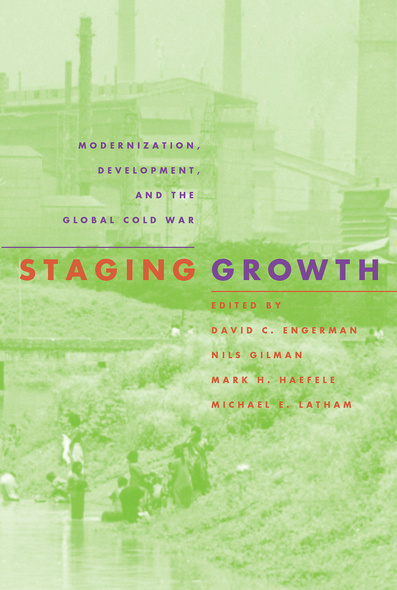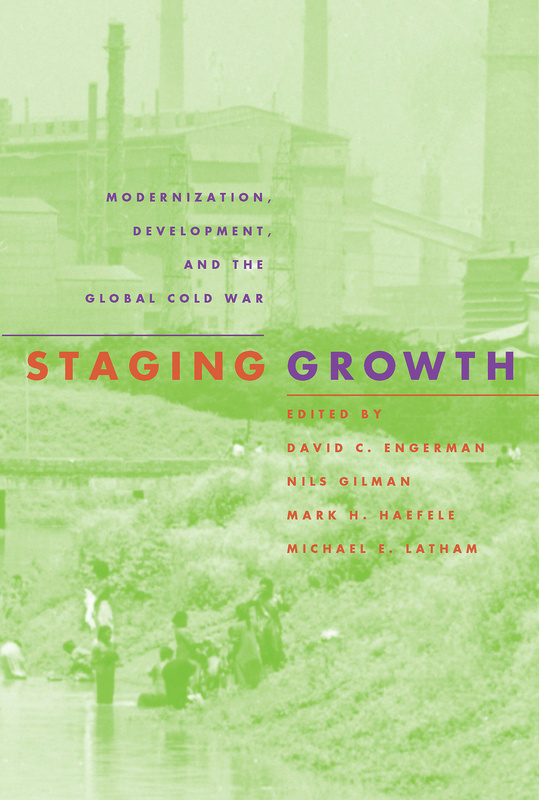Staging Growth
Modernization, Development, and the Global Cold War
University of Massachusetts Press
Beginning in the 1950s, the theory of modernization emerged as the dominant paradigm of economic, social, and political development within the American foreign policy establishment. Purporting to explain the stages through which all nations pass on the road to industrial modernity, it provided a rationale for a broad range of cultural and political projects aimed at fostering Third World growth while simultaneously combating communism.
But modernization theory was more than simply an expression of Cold War ideology. As the essays in this volume show, the ideal of modernization proliferated throughout the postcolonial world and across ideological lines in places as diverse as East Asia, Southern Africa, and South Asia. Indeed, it was embraced by all who shared the American enthusiasm for the increased production and higher standards of living promised by industrialization -enemies and allies alike.
Situating modernization theory historically, Staging Growth avoids conventional chronologies and categories of analysis, particularly the traditional focus on conflicts between major powers. The contributors employ a variety of approaches-from economic and intellectual history to cultural criticism and biography-to shed fresh light on the global forces that shaped the Cold War and its legacies. Most of the pieces are comparative, exploring how different countries and cultures have grappled with the implications of modern development. At the same time, all of the essays address similar fundamental questions. Is modernization the same thing as Westernization? Is the idea of modernization universally valid? Do countries follow similar trajectories as they undertake development? Does modernization bring about globalization?
In addition to the editors and Akira Iriye, contributors include Michael Adas, Laura Belmonte, Gregg Andrew Brazinsky, Christina Klein, J. Victor Koschmann, and Michael R. Mahoney.
But modernization theory was more than simply an expression of Cold War ideology. As the essays in this volume show, the ideal of modernization proliferated throughout the postcolonial world and across ideological lines in places as diverse as East Asia, Southern Africa, and South Asia. Indeed, it was embraced by all who shared the American enthusiasm for the increased production and higher standards of living promised by industrialization -enemies and allies alike.
Situating modernization theory historically, Staging Growth avoids conventional chronologies and categories of analysis, particularly the traditional focus on conflicts between major powers. The contributors employ a variety of approaches-from economic and intellectual history to cultural criticism and biography-to shed fresh light on the global forces that shaped the Cold War and its legacies. Most of the pieces are comparative, exploring how different countries and cultures have grappled with the implications of modern development. At the same time, all of the essays address similar fundamental questions. Is modernization the same thing as Westernization? Is the idea of modernization universally valid? Do countries follow similar trajectories as they undertake development? Does modernization bring about globalization?
In addition to the editors and Akira Iriye, contributors include Michael Adas, Laura Belmonte, Gregg Andrew Brazinsky, Christina Klein, J. Victor Koschmann, and Michael R. Mahoney.
Often in an essay collection the parts fail to hang together. But in this case, they collectively support an overall point: the way modernization theory worked so well in the abstract and so miserably in practice. Part I describes the intellectual satisfactions and appeal of the theory. Part II describes how effortlessly modernization was popularized. The final section shows how these loose conceptions worked in specific circumstances.'—Nick Cullather, Indiana University
'Original, stimulating, and quite helpful in enlarging our understanding of a recent period of international history. The essays make clear beyond a doubt that during the Cold War era, modernization was an important element of American foreign relations and international history that scholars no longer can afford to ignore.'—Frank Ninkovich, St. John's University
'Cold War theories of 'modernization' may have claimed universality, but these admirable essays show why historians need to direct their attention to specific localities and contexts. This book offers a remarkably rich exploration of the meanings of modernity and development in diverse areas of the world during the Cold War.'—Emily S. Rosenberg, Macalester College
'Staging Growth is an ambitious attempt by a talented group of scholars to analyze the impact of modernization theory on the Cold War. . . . (The book) is an excellent starting point for anyone wishing to examine the broader dimensions of the Cold War. The essays are intriguing, and they invite readers to delve deeper into this important topic.''—Project MUSE
David C. Engerman is assistant professor of history at Brandeis University. Nils Gilman is a postgraduate fellow at the University of California, Berkeley. Mark H. Haefele is a lecturer at Harvard University. Michael E. Latham is associate professor of history at Fordham University.






